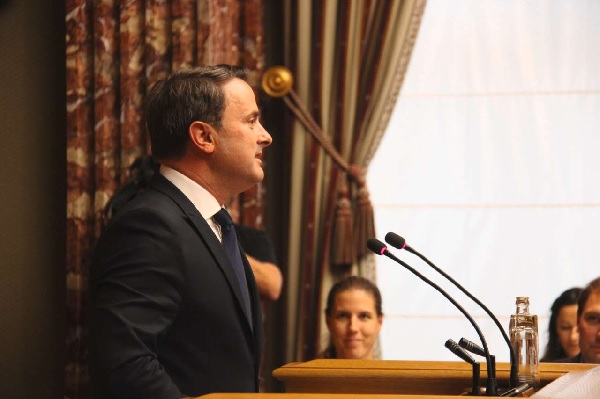 Xavier Bettel delivers his State of the Nation address;
Credit: © ME
Xavier Bettel delivers his State of the Nation address;
Credit: © ME
On Tuesday afternoon, Luxembourg's Prime Minister, Xavier Bettel, delivered his traditional State of the Nation address for the new parliamentary session; in his speech, he presented the economic, social and financial situation of the country.
Prime Minister Xavier Bettel began his speech by lamenting the absence of Felix Braz (Green Party), who is recovering from a heart attack, whilst also celebrating the former Justice Minister's contribution to Luxembourgish politics. He went on to welcome Braz's fellow party member, Henri Kox, in his new role as Luxembourg's Minister for Housing and Associate Minister of Defence and Homeland Security.
Turning to the country's future, Xavier Bettel referred to the current period as "a crucial phase" for setting out priorities in areas such as the economy and a high quality of life, as well as Luxembourg's role in the European Union. He added that now is the time for the international community to decide how to tackle "the global challenge of climate change, poverty and conflict".
Climate Change
The Prime Minister recalled the recent flooding in Mullerthal, which is evidence of the impact of climate change on Luxembourg. He went on to discuss the recent United Nations IPCC Climate Report, which highlighted the consequences of global warming for the Earth's oceans and ice masses. Whilst recognising the urgency of the situation, Xavier Bettel recalled that it is still not too late to make a change. He also confirmed the government's recognition of citizens' demands for politicians to act, as well as the government's determination to achieve its target climate goals and its full commitment to the Paris Agreement.
Xavier Bettel added that Luxembourg is already experiencing a significant shift towards renewable energy and electromobility. In addition, the country has doubled its annual contributions to the climate fund. He later mentioned that the coalition government is working on "an exhaustive climate protection law". Nevertheless, Prime Minister Bettel recalled that neither Luxembourg nor the EU as a whole can fully tackle climate change, especially not without the support of the USA and China.
New Technologies & Data Protection
The Prime Minister proceeded to dispel the myth that "positive economic development is [...] in contradiction to ambitious climate targets". He went on to highlight the diversification of the economy in recent years, as well as the continued importance of Luxembourg's financial centre and the growth of new technologies.
Commenting on the Google data centre in Bissen, Prime Minister Bettel recognised the impact this will have on Luxembourg's resources, but recalled that the government and the firm had agreed that the centre "must operate as energy efficiently as possible and the consumption of resources must be kept as low as technically possible". He also highlighted the foreseen benefits of this centre for the country's new technologies sector.
Later in his speech, the Prime Minister discussed the role of the internet and data protection, stating: "There are billions of data on billions of people worldwide and that has its benefits, it has potential in our development, but of course it has its dangers. Advantages include technological advancement". Having discussed the impact of the EU's General Data Protection Regulation (GDPR), he added that the Luxembourg government had begun the first phase of a new artificial intelligence strategy, with a public consultation foreseen before the end of the year. He also mentioned that Parliament would present a draft text on camera surveillance in the coming days, as well as changes to the police database. Prime Minister Bettel concluded the subject by discussing the role of the government's Commission for Data Protection in "improv[ing] and ensur[ing] the privacy of its citizens".
Brexit
Turning to Brexit, Luxembourg's Prime Minister lamented the UK's "regrettable" decision to leave the EU and maintained that a no-deal Brexit would have negative consequences for all involved. However, he continued: "We want to offer our British citizens who live and work here with us as much stability and security as possible". He added that British citizens residing in Luxembourg would be able to apply for a third-country permanent residence permit during a one-year transition phase. Prime Minister Bettel also recalled that the government had approved a 21-month transition period for Luxembourg regulators in the financial and insurance sectors. He concluded that both Luxembourg and the EU required "stability" in these times.
Economy & Finance
The Prime Minister expressed contentment with the "healthy and sustainable" nature of Luxembourg's finances. In addition to maintaining its Triple A credit rating, Luxembourg's central administration budget for 2018 recorded a surplus for the first time in a decade. He added: "The trend remains very positive for this year as well. At the end of June, a surplus of €869 million was recorded". Meanwhile, expenses were up by "only 2.8% or around €250 million".
Population Growth & Investment
Concerning demographic growth, Xavier Bettel highlighted the challenges posed by significant increases in both the Luxembourgish population (up more than 20% over the past decade) and the number of cross border workers coming into the country each day (up by one-third). To respond to challenges such as increased pressure on infrastructure, he emphasised the need for investment. In this context, the government has foreseen over €3 billion of investment in its multi-annual budget for 2023.
Concluding Remarks
As his speech came to a close, the Prime Minister cited research, health and cultural development as some of the other key areas to be addressed over the next twelve months. He maintained that the coalition government's main mission was to "ensure more justice and put the individual at the centre". He concluded by emphasising the need for reforms in areas such as tax and housing.








